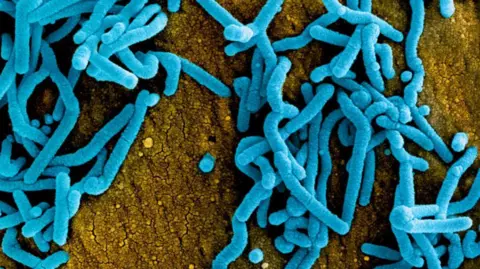The nation has officially rejected the WHO’s recent claims of a Marburg virus resurgence in the Kagera region, where eight deaths were reported.
The nation has unequivocally dismissed a recent proclamation by the World Health Organization (WHO) regarding a presumed resurgence of the Marburg virus, an Ebola-like infection, in the north-western quadrant of the nation.
On Tuesday, the global health authority reported a cluster of nine suspected cases recorded over a five-day span within the Kagera region, including a grim tally of eight fatalities.
However, in an official communiqué, Tanzania’s Minister of Health, Jenista Mhagama, declared that comprehensive laboratory analyses revealed no evidence of Marburg virus presence among the alleged cases, according to BBC News.
🚨 #Tanzania denies the suspected Marburg virus outbreak in the Kagera region.
— Ilẹ̀ Adúláwọ̀ (@TheAdulawo) January 17, 2025
Is this just a false alarm, or should we be concerned? Drop your thoughts below! ⬇️ #MarburgVirus #TanzaniaHealth #Africa #Epidemic #TheAdulawo #AfricanNews pic.twitter.com/pNKs0BUxBZ
The minister emphasized the nation’s enhanced vigilance, stating, “Our surveillance mechanisms and epidemiological monitoring have been bolstered significantly.” Mhagama further assured international entities, including the WHO, that Tanzania remains steadfast in providing timely updates on health-related developments.
Tracing Marburg’s Footprints in Tanzania
In March 2023, Tanzania encountered its inaugural Marburg outbreak in the Bukoba district, claiming six lives over nearly two months. The disease, notorious for its high contagion rate, mirrors Ebola in its symptomatology, presenting with fever, myalgia, severe gastrointestinal distress, and, in dire cases, death due to massive hemorrhage.
Addressing the most recent suspicions, WHO Director-General Tedros Adhanom Ghebreyesus underscored the potential for further cases to emerge as surveillance capacity expands. Patients, including healthcare personnel, have been identified and are under meticulous observation.
Deploying Resources Amid Regional Concerns
In response, the WHO highlighted that Tanzania had mobilized rapid response units to track suspected infections and curb the potential spread. The organization also noted the elevated regional risk attributed to Kagera’s status as a transit nexus, facilitating frequent cross-border interactions with the Democratic Republic of Congo, Uganda, Burundi, and Rwanda, as per BBC News.
Despite these concerns, Dr. Tedros refrained from recommending travel or trade limitations involving Tanzania, reiterating on X (formerly Twitter) that the global threat level remains classified as “low” at this juncture.
Comprehensive Investigations and Regional Parallels
Following WHO’s pronouncement, Tanzanian health authorities dispatched a team of specialists to Kagera to collect samples for laboratory testing. Minister Mhagama confirmed that all samples returned negative for Marburg, though she did not specify the exact number of cases examined.
Rwanda, a neighboring nation, recently declared its Marburg outbreak—affecting 66 individuals and resulting in 15 deaths—officially concluded in December, as per BBC.
A Virus Without Borders or Cure
The Marburg virus, with a mortality rate averaging 50 percent according to WHO data, is primarily transmitted from fruit bats to humans. Subsequent human-to-human transmission occurs through direct contact with infected bodily fluids. Presently, no definitive treatments or vaccines exist, though experimental trials are ongoing.





